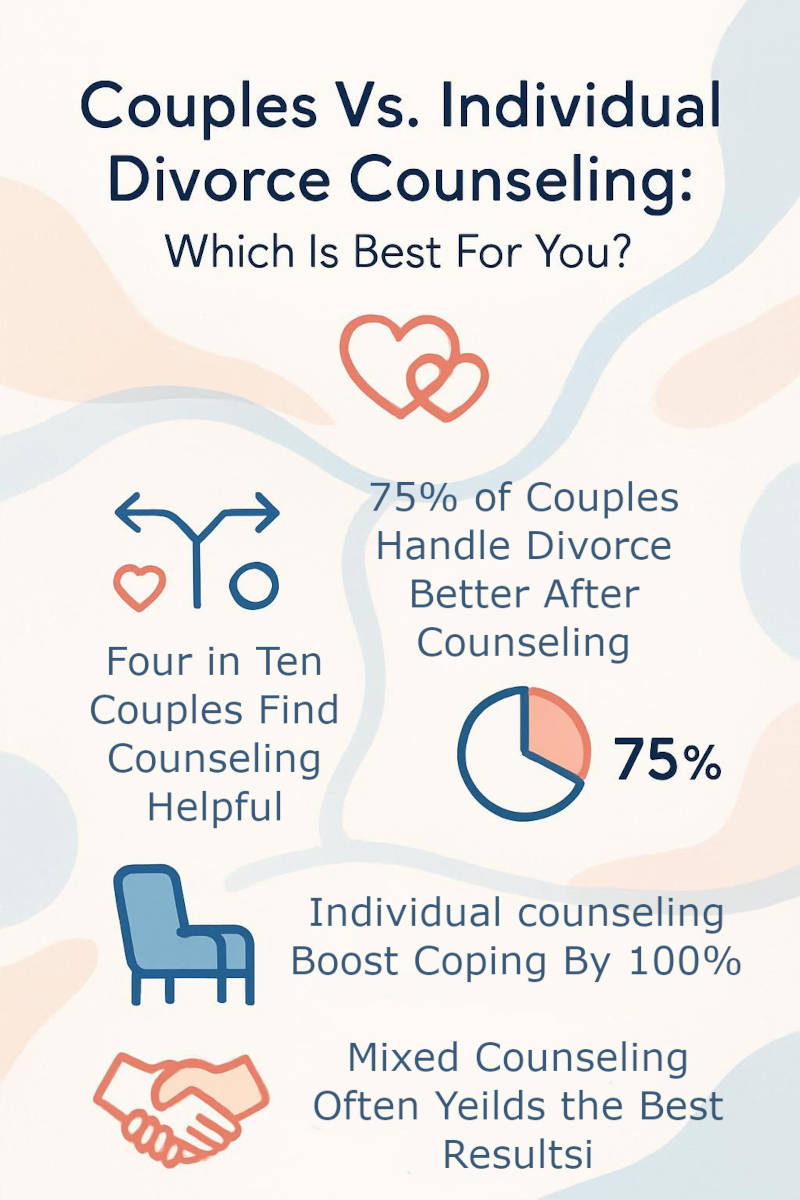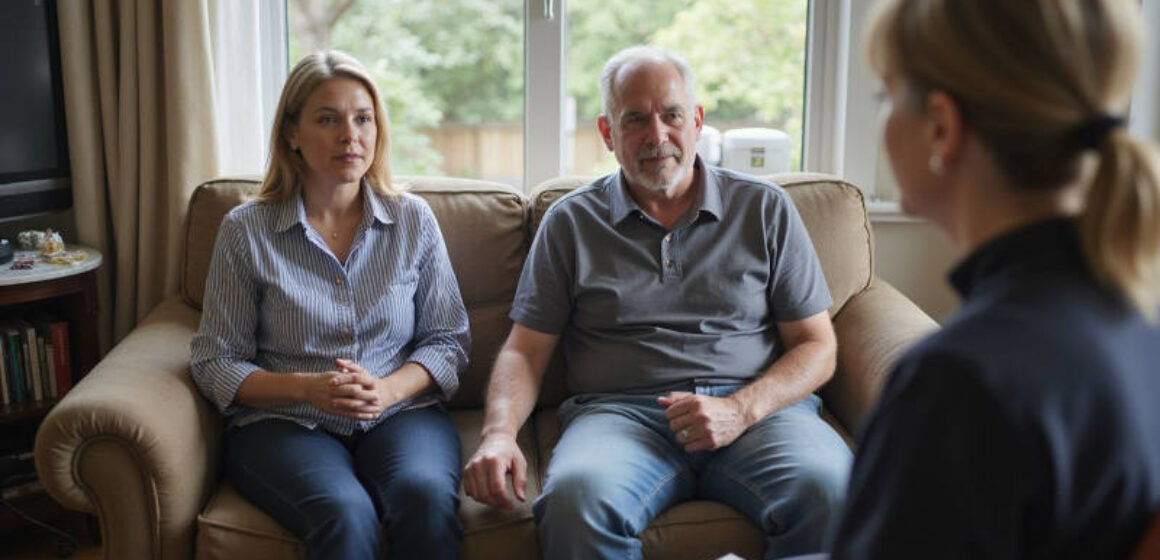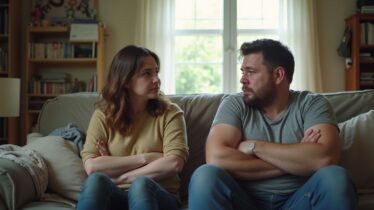Couples Vs. Individual Divorce Counseling: Which Is Best For You?
Going through divorce feels like walking in the dark. You might wonder if you should talk to someone alone or bring your partner along. Many couples just like you have stood at this same fork in the road.
The good news? Four out of ten couples who try counseling during divorce say it helps them feel better and think more clearly.
When life turns upside down, having someone to talk to can light the way forward. As a caring therapist in San Mateo, CA, I help people find solid ground during divorce. Whether you come alone or with your partner, we’ll work to ease your stress and sort through tough choices.
Every person’s path looks different. Want to find out which road makes sense for you?
Key Takeaways
- Four in ten couples say counseling helps them cope better with divorce. Both types of counseling serve different needs during this hard time.
- Couples counseling works best when both partners want to fix their marriage. They must show up ready to learn new ways to talk and solve problems. A safe space lets them work on trust and past hurts.
- Individual counseling gives private time to deal with feelings alone. It helps people cope with grief and plan their future. This path works well when one partner won’t join therapy sessions.
- Dr. Adekemi “Dr. O” Oguntala’s research shows 75% of couples handle divorce better after counseling. People in solo therapy report 80% better coping skills. Many find the best results by mixing both types.
- Licensed therapists can guide you to pick the right path. Check their state licenses first. Your goals and needs will help you choose between couples, individual, or mixed counseling.

Understanding Couples Counseling
Couples counseling helps partners fix their marriage through open talks and problem-solving skills. I guide couples to express their feelings, heal past hurts, and build trust in a safe space.
Goals of couples counseling
I help couples set clear goals in therapy to fix their relationship problems. My main focus stays on building better ways to talk, share feelings, and solve conflicts. The goals include fixing trust issues after hard times, making emotional bonds stronger, and learning to respect each other’s needs.
Each therapy session aims to teach partners good listening skills and healthy ways to express their thoughts. Partners learn to spot bad patterns in their marriage and replace them with positive ones.
My work as a marriage therapist helps create a safe space where both people can grow together and heal past hurts.
Common issues addressed in couples counseling
Couples often seek therapy for communication problems, trust issues, and intimacy concerns. My work as a marriage and family therapist focuses on these core challenges. Many partners struggle with conflict resolution, parenting styles, and financial disagreements.
The therapy sessions create a safe space to address infidelity, emotional distance, and resentment between partners.
Mental health plays a big role in relationship problems. Partners might deal with anxiety, depression, or past traumas that affect their bond. The couples therapist helps build better coping strategies and emotional regulation skills.
Through clinical treatment, partners learn to handle intrusive thoughts and build emotional resilience together. This process leads to stronger communications and deeper understanding between partners.

Understanding Individual Divorce Counseling
Individual divorce counseling helps you face your emotions alone in a safe space. A mental health professional guides you through personal growth and healing while you process the end of your marriage.
Focus areas in individual counseling
I help my clients focus on personal growth during divorce through mental health therapy. My approach targets emotional healing, stress relief, and building coping skills. The sessions create a safe space to process feelings of grief, anger, or fear without judgment.
Each therapy session tackles specific challenges like self-esteem, future planning, and personal boundaries. The goal stays clear – to guide people through major life changes with professional support and proven psychology methods.
A social worker or therapist can offer tools to handle anxiety, depression, or other mental health issues that pop up during divorce.
Benefits of personal reflection during divorce
Personal reflection during divorce creates space for emotional healing and growth. My experience as a mental health professional shows that clients gain better self-awareness through this process.
The quiet time lets people process their feelings and learn from past relationship patterns.
Taking time alone helps build coping mechanisms and boosts emotional health. A person can work through grief, anger, or fear at their own pace without pressure. This private space allows deep thinking about future goals and personal values.
Many couples find peace through solo reflection before making big choices about their next steps.
When to Choose Couples Counseling
Couples counseling works best for partners who want to fix their marriage before divorce. I recommend this path if both partners show up ready to learn new ways to talk and solve problems together.
Strengthening communication and connection
Clear communication builds strong bonds in marriage counseling. I guide partners to express feelings safely through active listening exercises. Each person learns to share thoughts without blame or judgment.
The focus stays on speaking with respect and understanding each other’s needs.
My mental health approach helps couples create deeper connections through proven strategies. Partners practice new ways to talk about hard topics. Simple tools like daily check-ins and weekly date nights keep relationships fresh.
Making time for meaningful conversations helps rebuild trust and emotional closeness.
When both partners are willing to participate
Both partners must show a strong desire to fix their marriage through couples therapy. I see great results in my San Mateo CA practice when spouses commit fully to the process. Marriage counselors can help couples build better communication skills and trust.
The key lies in both partners staying open to change and growth.
Partners need to attend sessions regularly and do their homework between meetings. My experience shows that willing participants make faster progress in relationship counseling. Active engagement from both spouses creates a safe space to discuss hard topics.
Mental health professionals guide couples through tough conversations with care and respect.
When to Choose Individual Counseling
I help people find peace during divorce through private sessions that focus on their own growth. My clients learn to process their feelings and build strength without their partner present.
Coping with personal emotions during divorce
Personal emotions run deep during divorce. My experience shows that individual counseling creates a safe space to process grief, anger, and fear. A skilled therapist helps clients work through complex feelings without judgment.
The focus stays on emotional healing through proven methods like mindfulness and stress management.
Divorce brings big changes that need careful attention. The right individual therapist guides people to rebuild their mental well-being step by step. This includes dealing with loneliness, building self-worth, and planning for the future.
Many clients find relief in private sessions where they can speak freely about their struggles. Clear strategies help them move forward with hope and strength.
When one partner refuses couples counseling
I see many couples struggle with one partner’s refusal to attend therapy. My experience shows that individual counseling becomes vital in these cases. The refusing partner might feel scared, ashamed, or just not ready for couples work.
This creates a path for the willing partner to start their healing journey alone.
The willing partner can learn valuable skills through individual therapy sessions. A trained psychologist helps them cope with marriage stress and develop better communication tools.
The focus stays on personal growth and emotional health during this tough time. Many of my clients find strength in individual counseling while their partner takes time to warm up to the idea of couples work.
Combining Couples and Individual Counseling
I recommend mixing both couples and solo therapy sessions for the best results during divorce. A combined approach lets you work through shared issues with your partner while giving you private space to process your feelings with a trusted counselor.
Benefits of a mixed approach
Mixed counseling brings great results for couples going through divorce. My experience shows couples who mix personal and joint sessions heal faster. The mix helps partners work on their own feelings while learning to talk better together.
This setup lets each person deal with private thoughts through individual therapy sessions, then bring their progress to couples meetings.
Couples and personal counseling work together like pieces of a puzzle. Personal sessions give space to process anger or hurt with a therapist alone. Joint sessions teach both partners new ways to solve problems as a team.
This mixed therapy style helps create a smoother path through divorce or relationship changes.
Conclusion
The choice between couples and individual divorce counseling depends on your unique needs and situation. Your path to healing matters most during this time.
Dr. O, a licensed psychologist with 25 years of experience in marital counseling and behavioral health, shares her expert insights. She holds a PsyD from Stanford University and has helped over 1,000 couples through various stages of relationship challenges.
“Both counseling types serve different purposes,” Dr. O explains. “Couples counseling works best for partners wanting to improve communication or explore reconciliation. Individual counseling helps people process emotions and build personal strength during divorce.”.
Dr. O emphasizes the importance of licensed therapists and proper mental health care during divorce. She recommends checking counselor credentials through state licensing boards and professional organizations.
“Many clients benefit from a combined approach,” notes Dr. O. “They attend couples sessions to address relationship issues while working through personal growth in individual therapy.
This strategy often leads to better outcomes.”.
Dr. O points out the success rates: “Couples who try counseling before divorce show 75% better emotional adjustment. Those in individual therapy report 80% improved coping skills.”.
The final choice rests on your goals. Couples counseling fits if both partners want to work on the relationship. Individual counseling serves better for personal healing and growth through divorce.
Talk to a qualified therapist to find your best path forward.
FAQs
1. What’s the main difference between couples and individual divorce counseling?
Couples therapy needs both partners to work with marriage therapists together. Individual counseling lets you talk one-on-one with a psychologist about your feelings and plans.
2. How do I know which type of divorce counseling fits me best?
Your choice depends on your goals and if both partners want to fix the romantic relationship. A behavioral health expert can help you pick the right path.
3. Can I switch between individual and couples counseling?
Yes. Many people start with individual sessions through services like Talkspace, then move to couples counseling if their partner agrees.
4. Will counseling help if my partner has mental illness or addiction?
A PsyD or empathetic therapist can guide you through these complex issues in either format. Family planning and breakdown concerns need special care and knowledge.
5. Do divorce counselors act as mediators?
Marriage therapy experts can teach you better ways to talk to each other, but they’re not legal mediators. Their job is to help heal minds and guide decisions about your future.



